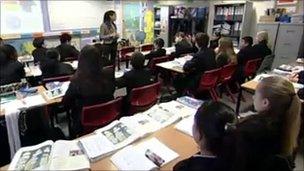'One in, one out' school exclusions rules on hold
- Published

Under behaviour partnerships, many pupils have been moved to different schools, rather than excluded
The government has put on hold the implementation of rules forcing schools in England to co-operate locally over excluded pupils.
Due to come into force in September, they would have meant all schools, including academies, had to join local behaviour partnerships.
Under these, schools expelling one pupil often would have to take an excluded pupil from another school.
The government said it wants to reduce bureaucracy to tackle poor behaviour.
However, with the coalition pushing to expand academies, which operate outside the control of local authorities, there are concerns that if schools are able to pull out of local arrangements, those with a higher proportion of disadvantaged pupils will suffer.
The Nasuwt teachers union said the decision to remove the requirement for cooperation risked increasing classroom disruption, bullying, gang-related violence and truancy.
Before it came to power, the Conservative Party said it would "abolish the government's new rules forcing good schools to take pupils expelled from bad ones" - which is commonly known as "one in, one out".
'Unnecessary bureaucracy'
The Department for Education said it was reviewing its policy on behaviour.
Under the suspended rules, schools would also have had to record every incident in which a teacher used force against a pupil.
A department spokesman said most schools already record incidents where force was used and are members of behaviour partnerships.
"We are looking at whether imposing a legal requirement to do this would be an unnecessary layer of bureaucracy," she added.
"This is about putting our trust back in front line professionals. We have already committed to strengthening the guidance and if necessary legislation around the use of force to give teachers the confidence to use these powers," she said.
She said the provisions had been delayed while the government reviewed "a whole range of burdens and requirements on schools".
'Sink schools'
Ministers were looking at how to reduce exclusions and to improve provisions for pupils that did get expelled, she added.
The coalition says pupil behaviour is one of its key priorities, and has already outlined plans to toughen teachers' powers to search pupils for banned items and give anonymity to teachers facing allegations from students.
Nasuwt Deputy General Secretary Patrick Roach said allowing schools to opt out of the behaviour partnership risked creating "sink schools".
He said that when the Labour government initially created academies, these had a higher rate of expulsions than other schools, but failed to "take responsibility" for pupils excluded from other schools in their local areas.
The local behaviour partnerships were established to address the issue, he said, giving such schools a duty to support pupils excluded from other schools.
Under the partnerships, pupils at risk of exclusion are often moved to other schools.
"The more schools that attempt to go it alone, the worse it will be," he said.
Labour's shadow education minister Iain Wright said the decision was a "short-sighted but ominously ideological move".
"The worry is that by not requiring schools that exclude a child to accept in turn one excluded from another school, carte blanche could be given to a minority of schools to use exclusions as a first resort instead of a last resort. This risks those left behind being left to pick up the pieces and tackle the toughest discipline problems," he added.
Fears over force
The Children's Rights Alliance for England said it was concerned about the decision to end the obligation on teachers to record the use of force against students and inform their parents.
"That the government has removed this basic safeguard for children without any explanation or public announcement is simply unacceptable," said national coordinator Carolyne Willow.
"Parents will undoubtedly be shocked to hear that they have no right to be notified if a member of staff uses force on their child."
The rate of permanent exclusions (expulsions) fell by 19.4% in 2008-9 compared with the previous year, according to official figures.
Much of the fall has been attributed to schools and councils trying to avoid exclusions by moving pupils from one school to another.
Many of these moves are managed under local behaviour partnerships.
- Published10 August 2010
- Published29 July 2010
- Published10 July 2010
- Published7 July 2010
- Published7 July 2010